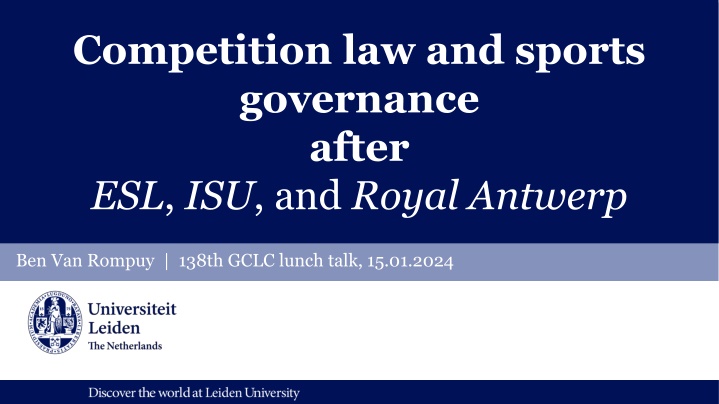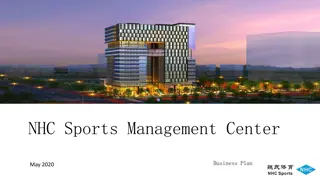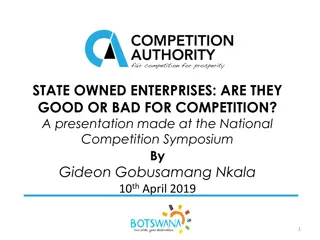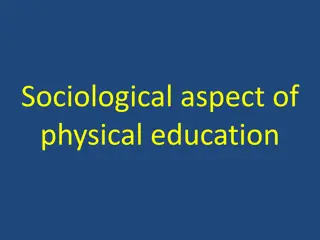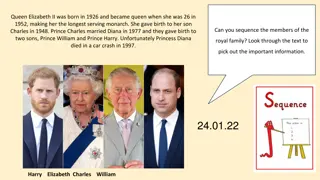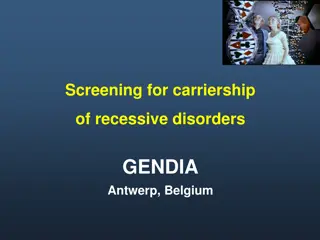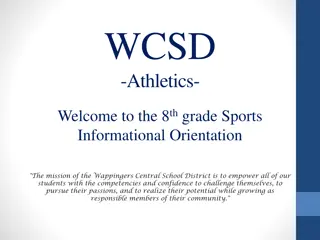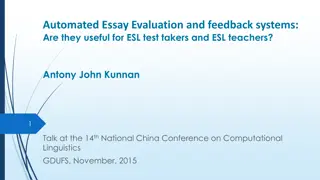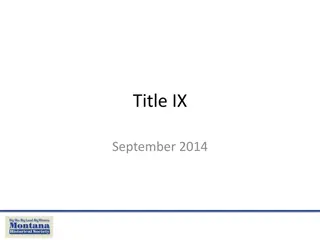Competition Law and Sports Governance: Analysis of ESL, ISU, and Royal Antwerp Cases
This presentation delves into the intersection of competition law and sports governance, focusing on landmark cases such as ESL, ISU, and Royal Antwerp. It explores the positioning of sports governing bodies, the legitimacy of their authority, gatekeeping powers, and the specific challenges faced in the realm of professional football. The content examines the Court's perspectives on SGBs' sovereignty, justification frameworks, and the role of the Court of Arbitration for Sport, shedding light on the legal autonomy of SGBs to enforce rules related to competition organization, proper functioning, and athlete participation. It underscores the necessity of gatekeeping powers in ensuring homogeneity, coordination, and compliance within the sports ecosystem.
Download Presentation

Please find below an Image/Link to download the presentation.
The content on the website is provided AS IS for your information and personal use only. It may not be sold, licensed, or shared on other websites without obtaining consent from the author.If you encounter any issues during the download, it is possible that the publisher has removed the file from their server.
You are allowed to download the files provided on this website for personal or commercial use, subject to the condition that they are used lawfully. All files are the property of their respective owners.
The content on the website is provided AS IS for your information and personal use only. It may not be sold, licensed, or shared on other websites without obtaining consent from the author.
E N D
Presentation Transcript
Competition law and sports governance after ESL, ISU, and Royal Antwerp Ben Van Rompuy | 138th GCLC lunch talk, 15.01.2024
Where do the three cases fit? Sports governing bodies (SGBs) Different practices, different types of antitrust challenges
Overview 1. The Court on the functional sovereignty of SGBs 2. The Court on the applicable justification frameworks 3. The Court on Court of Arbitration for Sport
Legitimacy of governance authority Legal autonomy of SGBs to adopt, implement, and ensure compliance (through disciplinary sanctions) with rules relating to: a. the organisation of competitions b. their proper functioning c. the participation of athletes therein In the specific context of professional football, this includes, inter alia: - Conditions in which clubs can put together teams participating in interclub or national team competitions, incl. nationality requirements [RA 104-106] - Pre-authorisation system for third party events, accompanied by prohibition for clubs and players to participate in unauthorised events [ESL 142]
Gatekeeping power (1) Is legitimate in principle >< EC in ISU decision: does not take a view on legitimacy of prior approval [254] And, as such, not abusive [ESL 145] - - Ex ante control + sanctions = suitable means to [ESL 144, 146, 175, 196] ensure homogeneity and coordination of competitions within overall match calendar; promote holding of competitions based on equal opportunities and merit; ensure compliance with common rules + principles, values, and rules of the game underpinning professional football, in particular the open, meritocratic nature of the competitions concerned ensure a certain form of solidarity contribution - - - - Notwithstanding the fact that it results in (near-)absolute control: at the current juncture it is impossible to set up viably a competition outside their ecosystem, given the control they exercise, directly or through their member national football associations, over clubs, players and other types of competitions, such as those organised at national level [ESL 149] -
Gatekeeping power (2) Strong repeated emphasis on: in the specific context of professional football and the economic activities to which the practice of that sport gives rise - specific characteristics [ESL 143] In ISU, only general reference to the legitimacy of adopting rules relating to the organisation and conduct of international competitions [144] Quid other sports?
Exercise of gatekeeping power (1) Article 106(1) jo. 102 TFEU case law dealing with State measures creating unequal conditions of competition fully applicable Perhaps even more strictly: safeguards to ensure equality of competition all the more necessary when an undertaking granted itself these gatekeeping powers, through its own conduct [ESL 137] Pre-authorisation system that IS NOT subject to restrictions, obligations, and review suitable for ensuring that it is transparent, objective, precise, and non- discriminatory = by its very nature abusive / by object restriction Pre-authorisation system that IS subject to = ?
Exercise of gatekeeping power (2) Effective forms of accountability required Framework providing for substantive criteria and detailed procedural rules that are: transparent, clear, precise non-discriminatory easily accessible enabling effective review - - - - Accompanied by sanctions that are transparent, objective, precise, non- discriminatory and proportionate (in light of nature, duration, and seriousness) because if discretionary: impossible to verify whether application in specific case justified and proportionate [ESL 148]
Exercise of gatekeeping power (3) Equality of opportunities (> effective market access) Principle of neutrality is imperative in this field [ESL 203] Criteria and rules should not make the organisation and commercialisation of third-party events and the participation of clubs and players therein subject to requirements which are either different from those applicable to competitions organised and marketed by the decision-making entity, or are identical or similar to them but are impossible or excessively difficult to fulfil in practice for an undertaking that does not have the same status as an association or does not have the same powers at its disposal as that entity and accordingly is in a different situation to that entity. [ESL 151]
Exercise of gatekeeping power (4) Simplicity is deceptive: application of principles less straightforward How to distribute scarce opportunities? = competitive equality of opportunities Breakaway leagues (cf. ESL) > independent events (cf. ISU)
Pre-authorisation system: main changes after decision EC a template? Eligibility Rules: o ISU General Regulations: Rules 102 to 107 (clarification of objectives, new written and oral procedure for imposing sanctions, maximum sanction ineligibility skaters 1 year (first time) or 2 years (recidivism), reinstatement can be requested per sanction when half of eligibility period is served) o Authorisation procedure and criteria: o ISU Communication No 2171 on Open International Competitions (non-discriminatory treatment applications ISU Members/third parties, objective ethical/technical/sporting authorisation criteria, good financial standing, calendar conflicts to be resolved by Director-General, procedure for ISU Council to consider approving novelty of format, solidarity contribution up to 10% of net profit) o ISU Code of Ethics (no longer applicable to third party organisers) o CAS appeal arbitration rules o ISU Constitution, Article 26 (mandatory jurisdiction of CAS, except for non-authorisation decisions in so far as they do not relate primarily to the application of ethical/technical/sporting criteria ) o
Overview 1. The Court on the functional sovereignty of SGBs 2. The Court on the applicable justification frameworks 3. The Court on the Court of Arbitration for Sport
Sports-specific considerations Sporting activity carries considerable social and educational potential and has specific characteristics which, whilst relating especially to amateur sport, may also be found in the pursuit of sport as an economic activity [ESL 102-103] Such specific characteristics may potentially be taken into account when applying EU law only in the context of and in compliance with the conditions and criteria of application provided for (in the respective provision) [ESL 104] Article 165 TFEU: no direct bearing on assessment - < Case C-325/08, Olivier Bernard - < Case C-22/18, TopFit and Biffi
Wouters exception The Court for the first time delineates (and confines) its scope: Applicable in particular in cases involving rules adopted by an association that regulate the exercise of a professional activity with a view to pursing certain ethical or principled objectives >< sustainability agreements - Also applicable to Article 102 TFEU Not applicable to by object restrictions or per se abuses Wholly unnecessary and problematic move Requires definitive classification of nature of restriction of competition/abuse, before considering whether there is a restriction of competition/abuse Diminishes distinctive feature (or even relevance) of the exception - - -
Wouters exception vs. efficiency defence Relationship between justification frameworks now less clear Criteria for establishing an efficiency defense are more stringent [ESL 189] Yet overlap with Article 101(3) TFEU: no elimination of effective competition Most prominent difference: efficiencies + fair share for consumers Necessary to establish positive impact on each of the various categories of users (incl. national football associations, professional or amateur clubs, professional or amateur players, young players, spectators, television viewers) [ESL 195] [RA 123] -
Efficiency defence Court demands strict scrutiny and considerable evidentiary burden Laudable objectives do not release (SGBs) from their obligation to establish that the pursuit of those objectives translates into genuine, quantifiable efficiency gains that compensate for harm to competition [ESL 196] How does this work for restrictions e.g. to protect health and safety of athletes or ethical values?
Overview 1. The Court on the functional sovereignty of SGBs 2. The Court on the applicable justification frameworks 3. The Court on the Court of Arbitration for Sport
CAS arbitration rules at issue Arbitration rules must comply with EU law when implemented (a) in the territory of the EU and (b) when concerning disputes concerning the exercise of sport as an economic activity (not disputes concerning merely the sport ) [ISU 189, 190] Judgment focuses exclusively on the judicial review of CAS awards Not at issue: the existence of the CAS Not at issue: the potential lack of independence of the CAS Not at issue: the appeal arbitration procedure as such
The issue(s) with CAS arbitration (1) CAS arbitration = forced and exclusive arbitration [cf. also ECtHR in Pechstein] But sports associations cannot limit the rights and freedoms conferred on individuals by EU law [ISU 196] Therefore, in that context, effective judicial review is particularly necessary to ensure compliance with Articles 101 and 102 TFEU [ISU 193, 195]
The issue(s) with CAS arbitration (2) Requirements for effective judicial review: o Court reviewing CAS award must be able to assess compliance with EU law (>< Swiss Federal Tribunal) o Court reviewing CAS award must be able refer preliminary questions to CJEU (>< Swiss Federal Tribunal) Cannot be remedied by possibility t0 claim damages ex post or to file complaint with competition authority, as the General Court had considered
The issue(s) with CAS arbitration (3) E.g. German Bundesgerichtshof in Case KZR 6/15, Pechstein v. International Skating Union, 7 June 2016 40. Die Schiedsvereinbarung der Parteien vom 2. Januar 2009 erfasst die mit der Klagegeltend gemachten Schadensersatzanspr che. 41. Die Kl gerin hatmit der Wettkampfmeldung vom 2. Januar 2009 die Sat-zung der Beklagten zu 2 anerkannt. Ausdr cklich Bezug genommen wird in der Meldung auf Art. 26 der Satzung sowie auf dieEntscheidungsbefugnis des CAS f r den Erlass von endg ltigen und bindenden Schiedsspr chen betreffend die Beklagte zu 2, ihre Mitglieder und alle Teilnehmer an Veranstaltungen der Be-klagten zu 2unter vollst ndigem Ausschluss der ordentlichen Gerichtsbarkeit. In Art. 26 der zum damaligen Zeitpunkt geltenden Satzung der Beklagten zu 2 war die Zust ndigkeitdes CAS geregelt. Danach sollten unter anderem auch Schadensersatzanspr chesowie andere Anspr che gegen die Beklagte zu 2, die anderenfalls Gegenstand eines Klageverfahrens vor einem Zivilgericht sein k nnten, derausschlie lichen Entscheidung durch den CAS unterfallen E.g. Belgian Court de Cassation in Case C.20.0429, Royal Football Club Seraign v. FIFA, 8 September 2023 preliminary reference Case C-600/23
The issue(s) with CAS arbitration (4) Professional athletes, whose career may be especially short , cannot be deprived from bringing an action before a relevant national court: - seeking protective measures - seeking to have conduct brought to an end or a measure reviewed and annulled if necessary, following a prior arbitration procedure that provides for such a procedure [ISU 201]
Concluding thoughts 1. No principled objection to dual role SGBs, but virtual separation (neutrality!) demanded when exercising gatekeeping power 2. Pre-authorisation: principles clear, implementation less so next battleground: international sporting calendar 3. Focus now on football, but Court recognizes that each sport presents different legal and economic context (and model) 4. Inherent uncertainty in object/effect classification of sporting practices likely to prompt shift in focus from Wouters exception to a far less suitable cost-benefit assessment 5. National courts likely to more easily accept jurisdiction, despite mandatory CAS arbitration
v Dr. Ben Van Rompuy Leiden University b.van.rompuy@law.leidenuniv.nl @BenVanRompuy
